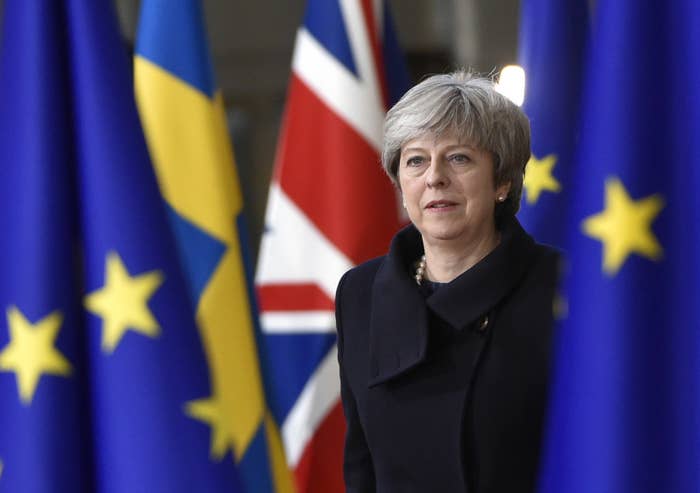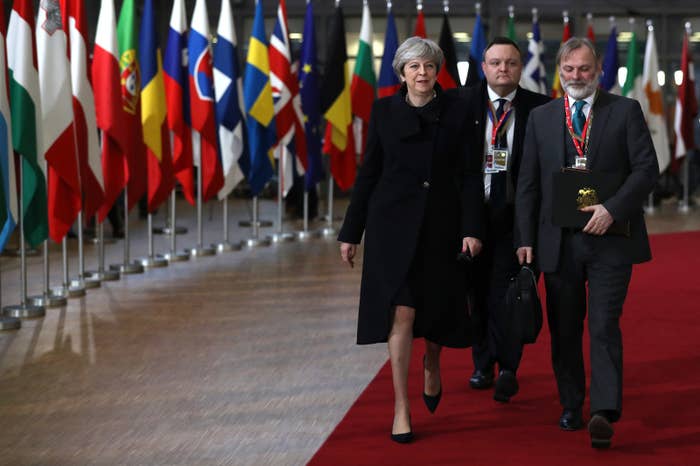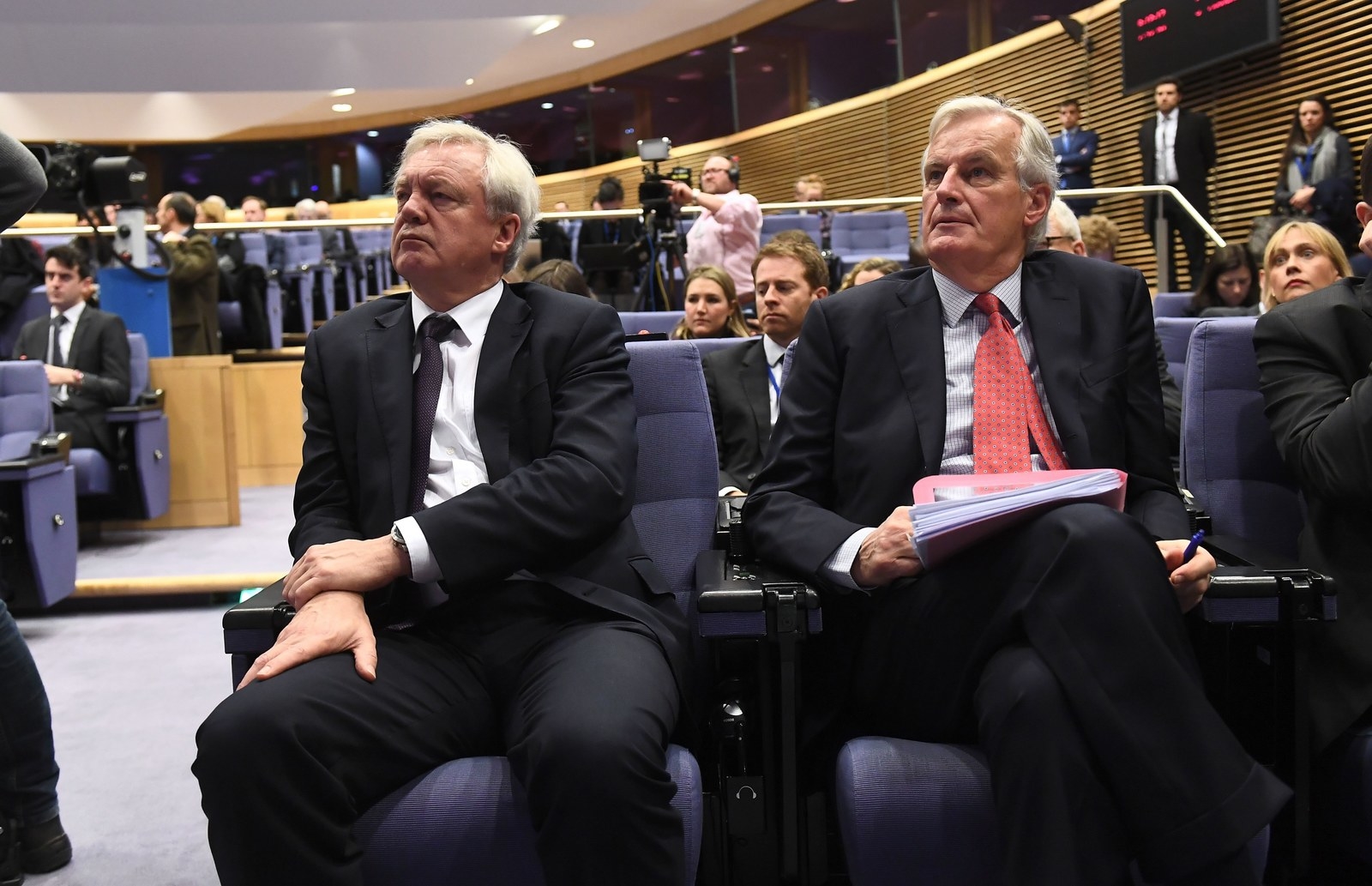
BRUSSELS – The second phase of Brexit has officially begun. Following months of often gruelling negotiations and drama, the European Union’s remaining 27 member states took a few minutes to declare that progress was sufficient and agree the next set of negotiating guidelines at a summit in Brussels on Friday morning.
Speaking in her Maidenhead constituency on Friday, Theresa May welcomed this "important step", adding: "There is still more to do but we are well on the road to delivering a Brexit that will make Britain strong, prosperous, and secure."
But while the prime minister and her cabinet colleagues were celebrating getting through the first phase of negotiations, Donald Tusk, the president of the EU Council, cautioned that the next phase of talks on the future relationship would be "more demanding, more challenging".
The reality for May is that she has finally emerged from the trenches – only to be confronted by a minefield.
“If there is one thing the EU is good at, for better or for worse, it’s creating processes,” a senior EU official told BuzzFeed News.
Having agreed back in June, after “the row of the summer” that never was, to sequence the negotiations as demanded by the EU, the UK now finds itself boxed into a process over which it has little control.
The design of the Brexit process is structured somewhat like a video game. Levels are cleared one at a time, with progress unlocked only once all the tasks laid out for the prime minister have been passed.
With each step, May effectively faces a binary choice: Accept the EU’s terms, or walk away with no deal. Now that MPs will have a meaningful say on the final Brexit deal, they too will have the same binary choice. Unless the UK asks to extend the negotiations, and the other 27 governments all agree to do so, Britain is leaving the EU on 29 March 2019, with or without a deal.

After clearing the first hurdle, the guarantees provided by May to protect the rights of EU citizens living in Britain, cover all financial commitments after Brexit, and avoid a hard border in Ireland under all circumstances must now be translated into a legal format before negotiations can properly progress on to the next level.
Having green-lit the next phase of Brexit, the 27 leaders spent about an hour on Friday talking about next steps. During these discussions a number of leaders, including Germany’s Angela Merkel, were adamant that each phase of the negotiations, including transitional arrangements, had to be put into a legal text before moving forward onto the substance of any next phase due to some suggestions in the UK that what had been agreed so far wasn't binding, two sources with direct knowledge of the conversations told BuzzFeed News.
According to the same sources, the German chancellor also raised the point that any transition period should be as short as possible. BuzzFeed News understands this is because any interim phase much longer than two years would overflow into future budget cycles, complicating matters further.
A senior official involved in the negotiations told BuzzFeed News that the aim was to work on legal texts in January. “It’s a key step to make before progress can be made on transition,” the official said.
The negotiating guidelines for the second phase of talks are clear in the path they set: The next round of negotiations will focus primarily on transitional arrangements.
These will form part of a withdrawal agreement that in turn will be accompanied by a political declaration – not a trade deal – on the scope of the future relationship. “The aim is to have a political declaration, [which is] not a free trade agreement or a legal treaty, but a broad outline of the future trade, security and defence relationship by autumn 2018,” an EU official said. “Think of it as guidelines for the trade talks that will take place after March 2019.”
And talks about the declaration’s content will begin only once the UK spells out what it wants from Britain’s post-Brexit relationship with the EU.
A senior European government official told BuzzFeed News: “Britain needs to let us know which ties they want to sever and to what extent they want to withdraw from the EU as it is so that the EU27 can decide on the ‘price’ that Britain will have to pay for this.”
Another official said: “The key is the balance of rights and responsibilities. We cannot allow imbalances between the two as that would also have an impact on our relations with other third countries, Norway, South Korea, Japan, the World Trade Organisation and so on.”
"Britain has to tell us what they want," says Merkel, when asked if UK shd stay in customs union. "I did not parti… https://t.co/SfBjxm4Fc4
Answering a question from reporters on whether trade talks could be concluded by March 2019, the president of the European Commission Jean-Claude Juncker said: “I think that the real negotiations on the second phase will start in March next year. I cannot say when these negotiations will be concluded.”
May will also need to be careful to avoid the occasional burst of badly aimed domestic fire from her ministers and rebellious backbench MPs.
Claims by May's Brexit secretary David Davis that the terms she agreed on phase one issues after weeks of excruciatingly detailed negotiations were not binding caused irritation among European diplomats, and contributed to a tightening of the language in the drafting of the negotiating guidelines that will frame the second phase of talks.
A diplomat from a major European government involved in the process told BuzzFeed News: “If anything, it shows it’s a good idea to have clear language. As Barnier said, there can be no backtracking. Since there are doubts on the status of the deal, it’s not a bad idea to be clear.”

All of which reaffirms that the terms of the UK’s departure from the EU, and at least two years of standstill transitional arrangements, will be carved into a legally binding agreement long before the details of any trade deal between Britain and the EU are finalised.
In parallel, the guidelines approved this week will be translated into a new directive that will set the scope of EU chief negotiator Michel Barnier’s negotiating mandate in the months to come. His focus will be on the terms of a transitional period between Britain’s departure from the EU and the final landing place.
The guidelines, approved on Friday, make clear that the UK will temporarily remain in the customs union and single market (with all four freedoms – of movement of goods, services, people, and capital) for a period of around two years, and will need to comply with all existing EU “regulatory, budgetary, supervisory, judiciary and enforcement instruments and structures”, including the European Court of Justice.
At the same time, Britain will lose its place within the EU’s institutions and at the tables where decisions are made.
One diplomat noted that the “sufficient progress” affirmed this week didn’t mean that all issues related to Britain’s exit from the EU had been sorted. “In particular, we need to negotiate the governance of the overall deal,” the diplomat added.
The stickiest of the first phase issues, how to avoid a hard border in between the Republic of Ireland and Northern Ireland, will continue to be treated as a “distinct strand” in phase two – and, according to an EU official involved in the talks, “a whole lot of work needs to be done".
Under the terms signed up to by May, in the absence of agreed solutions for Northern Ireland, the UK will maintain full alignment with any rules of the single market and the customs union that are essential to north-south cooperation, the all-island economy, and the Good Friday peace agreement.
The controversial clause nearly collapsed the negotiations altogether because Northern Ireland's Democratic Unionist Party (DUP), the unionist party that props up May’s minority government, feared it could lead to a separate customs and trading regime from the rest of the UK after Brexit, raising the possibility of border checks for people and goods travelling between Northern Ireland and mainland UK.
“The documents says ‘full alignment’ would apply to the whole UK, but it will be up to the UK how to interpret the clause if it kicks in, for example if there is no deal. The substance of the matter is clear, and I would point out there are many sectors covered by north-south cooperation, the all-island economy, and the Good Friday Agreement,” the senior EU official said.
“It is very important to understand that Northern Ireland is a unique situation, and solutions that will be allowed in Ireland will not be applicable elsewhere,” the official added, referring to suggestions that any flexibility shown towards the island of Ireland could also apply to the future EU-UK trade relationship.
Under the roadmap agreed this week, the EU27 will be hoping to adopt guidelines about the future relationship at the next European Council, in March, in order to then begin negotiating the political declaration.
“The aim is to have a political declaration, [which is] not a free trade agreement or a legal treaty, but a broad outline of the future trade, security and defence relationship by autumn 2018. Think of it as guidelines for the trade talks that will take place after March 2019,” the official said.
In the run up to the March summit, the EU27 will talk about the future relationship among themselves. However, they will not set out their position until the UK says what it wants from its post-Brexit relationship with the EU.
Effectively, May has three months to unite her cabinet and parliament around a position that will define Britain’s post-Brexit future if the EU27 are to agree in March to a new set of guidelines that look beyond the transitional phase.

Arriving in the Belgian capital on Thursday afternoon, May was welcomed by a succession of warm words from Europe’s leaders. One after the other, the leaders went to great length to voice their support for May after the disappointment of her defeat in the Commons earlier this week.
On Thursday evening, during dinner, the 27 even broke their custom of not responding to May’s updates about Brexit by praising the perseverance she has shown so far in getting a deal done, a senior European government official told BuzzFeed News.
“She spoke then [German chancellor] Merkel thanked her. There was a polite applause at the end of Merkel’s intervention,” the official said.
The same official noted that May appeared a lot more confident and comfortable in her recent interactions with the other leaders compared to previous encounters. Adding, however, that May remained cagey about details of the ambitious, deep and special partnership the UK is seeking.
"She is conscious of time, and has made clear that she cannot afford to delay Brexit," the official said.
At home the mood is less celebratory. Ministers have yet to discuss the end state of Brexit that the government is aiming for, and for May, squeezed between Remainers and hard Brexiters within her own party, the moment to decide just how far to push ahead with her stated objective of taking the UK out of the single market and the customs union is fast approaching.
“The negotiations are in London, not in Brussels,” a head of government told BuzzFeed News.
